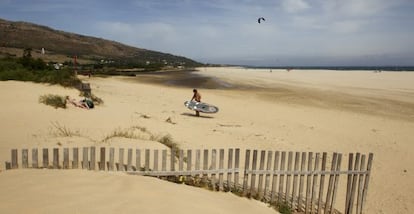Andalusia turns back to the brick
Towns throughout the southern region are pushing ahead with ambitious building projects in a bid to generate employment and kick-start local economies

As Spain approaches its fifth year of a double-dip recession largely brought about by the collapse of a decade-long construction boom, local governments throughout Andalusia seem to be coming to the conclusion that the only way to generate employment and get the economy going is by encouraging property developers and real estate companies to start building again.
Last summer, the town hall in surfers' paradise Tarifa, on the Atlantic coast in Cádiz, announced the construction of a hotel and residential complex. More recently, Córdoba said it was in talks with a private construction firm to build a 141-million-euro sports and leisure complex. Meanwhile, Seville has approved zoning changes that will allow it to build underground car parks in the city's old quarter as well as new houses and shops. In Jaén, the city council says it is to build 10,000 new low-cost homes.
How to interpret this sudden urge to build? The optimists say that it represents the first green shoots of impending economic recovery; critics say that it shows that many local councils are simply returning to the policies that got us into this mess in the first place. The goal of towns and cities pushing ahead with building projects is simple: they want to find new revenue and kick-start their economies by creating jobs - any way they can.
Construction can be a development mechanism, but not a source of finance"
But as architect Manuel Ángel González Fustegueras points out, there is a real danger that town halls will once again become dependent on construction, which he says can be a "development mechanism, but not a source of financing."
Fustegueras has drawn up several town planning programs for cities such as Seville and Marbella over the last decade, and says that the criteria for changes to planning legislation must be based on real needs. On that basis, he sees no problem in Jaén building low-cost homes, or Jerez giving land away to businesses, as long as the land had already been set aside for industrial or commercial activities.
But he says that plans such as those being drawn up in Popular Party-controlled Seville, which involve rezoning areas to allow them to be used for commercial purposes, or in the case of the city's old quarter, changing the law to allow for parking spaces to be built, cannot be justified. "These are structural modifications and will affect the way the city has been planned and laid out. The only justification for the parking is that now cars are allowed into the city center, there are not enough parking spaces. But that is not a valid justification - that is the result of a decision that was taken knowing what the consequences would be," he warns.
The Socialist Party and the United Left opposition are against the proposed changes in Seville. Antonio Rodrigo Torrijos, the United Left's spokesman on the city council, has accused the PP of "a major intervention that will completely subvert the existing town planning program. We are returning to a model where the city depends on building. This is a model that is one of the main sources of our current problems. They are using the argument of creating jobs in order to press ahead with huge construction projects. We are being put in the position of seeming to be against creating jobs," he says.
Juan Espadas, a former head of housing in the regional government of Andalusia, says that city councils like Seville's are trying to change planning schemes agreed before they came into office because they are not capable of implementing them. "Many councils like this see town planning as a restriction, because it prevents them from taking short-term decisions."
This is a model that is one of the main sources of our current problems"
He says that Seville's town planning program, agreed under the former Socialist Party administration in 2006, is still valid. The problem is that City Hall doesn't know how to implement it. "The plan is impeccable in theory, but it requires the ability to attract investment to areas that you have decided require it."
But Miguel Rus, the head of Seville's property developers' association, disagrees. He says that town planning schemes need to be "flexible" and be able to be adapt land use as required. He adds that the banks are not lending to the construction sector, and that this is delaying economic recovery, but that until they start releasing funding, local government should continue to change the law to allow new land to be built on.
Jaén's Popular Party mayor, José Enrique Fernández de Moya, admits that the construction of 10,000 homes is a measure designed primarily to kick-start the economy, describing the proposal as "strategic." The opposition calls it "overblown," saying that there are barely 2,000 people on the waiting list for housing, with thousands of empty properties in the city.
Jaén City Hall wants to build 5,000 of the new homes in a business park opened a decade ago that is virtually empty. The idea is to rezone the land for housing purposes, and create a 140,000-square-meter park. The mayor says that the rezoning would double the value of the land.
The government says the housing market has already "touched bottom" after falling 30 percent since 2008, even though Prime Minister Mariano Rajoy admits that there will no economic recovery until 2014.
The International Monetary Fund forecasts a contraction of 1.3 percent this year, while Citigroup and Nomura both expect the depression to continue into 2014. The unemployment rate stands at 26.2 percent and rising.
Tu suscripción se está usando en otro dispositivo
¿Quieres añadir otro usuario a tu suscripción?
Si continúas leyendo en este dispositivo, no se podrá leer en el otro.
FlechaTu suscripción se está usando en otro dispositivo y solo puedes acceder a EL PAÍS desde un dispositivo a la vez.
Si quieres compartir tu cuenta, cambia tu suscripción a la modalidad Premium, así podrás añadir otro usuario. Cada uno accederá con su propia cuenta de email, lo que os permitirá personalizar vuestra experiencia en EL PAÍS.
¿Tienes una suscripción de empresa? Accede aquí para contratar más cuentas.
En el caso de no saber quién está usando tu cuenta, te recomendamos cambiar tu contraseña aquí.
Si decides continuar compartiendo tu cuenta, este mensaje se mostrará en tu dispositivo y en el de la otra persona que está usando tu cuenta de forma indefinida, afectando a tu experiencia de lectura. Puedes consultar aquí los términos y condiciones de la suscripción digital.









































